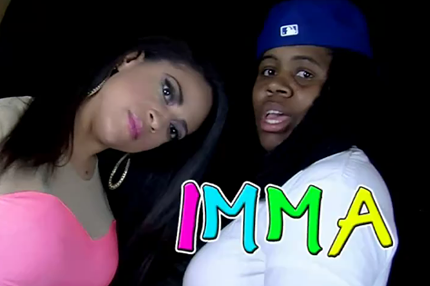Last week, Rainbow Noise’s frenetic, queer-friendly rap posse cut “Imma Homo” appeared on gay and GLBTQ-related blogs (the video currently has a respectable 68,000 views), and even sneaked onto a fewmainstream hip-hop venues like Bossip, Complex, and World Star Hip-Hop. Though posted on more mainstream sites primarily for its “WTF?” factor, it knocked over quite a few people for being, well, a pretty hot song. “Imma Homo” is nice, minimalist party rap (think Los Angeles’ Jerkin’ scene with a little Young Money thrown in) boasting punch lines for days (current favorite: “I beat the pussy up, call me Dyke Turner”). It isn’t that far removed from a lot of rap that gets played on the radio right now.
Rainbow Noise Ent. is, according to their website, a label based in the Pacific Northwest (Portland, Oregon and Vancouver, Washington, specifically) that specializes in “GLBTQ music artists with mainstream appeal.” Referencing “mainstream appeal” seems like a quiet way to differentiate “Imma Homo” from the single-minded, message-over-music “homo-hop” that hovered around the underground for much of the last decade. Thanks to the fall-out from “faggot”-filled invective courtesy of Eminem and pretty much every great ’90s New York rapper, there were rustlings of a corrective movement coming around the corner.
Finding an “out” rapper in the early 2000s was enough of a talking point that an openly gay Bed-Stuy MC named Caushun was afforded some press coverage (it was all a fairly involved hoax) and homo-hop groups like Deep Dickollective and Rainbow Flava were handed some alternative press coverage. Director Alex Hinton’s 2006 documentary, Pick Up The Mic, chronicled the activist-oriented gay rap movement, and in 2007, PBS aired Byron Hurt’s Hip-Hop: Beyond Beats & Rhymes, an investigation of hip-hop and masculinity. In 2008, industry insider Terrence Dean penned Hiding In Hip-Hop, a book that detailed an apparently pervasive “down low” culture within the rap scene.
Frankly, gay-themed hip-hop has been a bit hard to take seriously because, while it’s big on advocacy and ideas, it’s pathetically short on listenability, and doesn’t even come close to the technical quality of homophobic hip-hop. Most homo-hop gives off the same pseudo-subversive feeling of Christian Rock: The signs and signifiers are there, but it’s been gutted of all the energy and musical appeal in favor of politics or didacticism.
“Imma Homo,” though, is fascinating because it’s actually talking to hip-hop rather than talking at hip-hop. The beat rests somewhere between the avant-garde thump of, say, Clipse’s “Grindin'” and the nutty minimalism of the Bay Area; at the same time, the vocals have a tinge of the current fast-rap revivalism, while owing a debt to the all-encompassing “swag” rap phenomenon. It’s obvious that Rainbow Noise listen to a lot of rap music and want to jump in the fray. Their song is the sound of a bunch of rappers trying to come up with clever and ridiculous ways to talk some shit (“Next time you see me in the club / Don’t forget the butt plug”), and in that sense, it’s classically “hip-hop” in attitude.
Even more interesting is Rainbow Noise’s decision to employ rap’s problematic will-to-power aggression, choosing to flip it rather than get rid of it altogether. Much of the song mines one of hip-hop’s well-worn topics — mackin’ bitches — and so some sense it’s part of the “problem,” but that’s actually pretty refreshing. The song isn’t obsessed with playing nice or towing a party line. There’s a spousal abuse punch line in that “Dyke Turner” aside and a sexually violent metaphor (“I got eight bars to verbally rape those that hate”). Rap has always suffered at the hands of political correctness, with every offended group making demands, but Rainbow Noise, who seem like progressive liberal’s wet dream, wisely waste no time entering the political correctness vortex. And because of that, they end up being far more significant.
One excited Tumblr-er, upon viewing the “Imma Homo” video, commented “fock [sic] Born This Way, this is the gay anthem.” Gaga’s hit, as well-intentioned and wrong-headed as, say, Elvis Presley’s “In The Ghetto,” firmly aligns gay empowerment with the kind of all-inclusive self-help pop to which anybody can fist-pump. “Imma Homo” reveals it to be fairly toothless.
Rainbow Noise arrive at an interesting transitional moment for hip-hop. Kanye West and Lil Wayne, the two most important rappers of the past ten years, have addressed homophobia in interesting ways. Kanye rather infamously spoke out against it from the stage and in interviews, while Lil Wayne’s refusal to apologize for, or even explain, his mouth-kisses with label honcho/father figure Birdman (from Wayne’s “We Takin’ Over” freestyle: “Damn right I kiss my daddy”) is quite bold. Neither stance has altered the rappers’ careers much at all. If anything, they’ve been given too little notice for their actions.
Rap’s also currently caught in the middle of an endless loop of hype about Odd Future, whose rape and faggot jokes confound the sensitivities of many listeners. The recent Billboard cover story on the group (who owe a great deal to Kanye and Wayne, though they’d probably never admit it), mentions the homosexuality of Odd Future’s female producer/engineer/live DJ Syd tha Kyd. Though this doesn’t negate the group’s homophobic and sexually violent jokes, it does suggest a slightly shifting, though ultimately still immature, approach to one of hip-hop’s most loaded issues.
Like Odd Future, Rainbow Noise is a group of young, not-so-P.C. iconoclasts who derive much of their appeal from rap’s raw, visceral fuck-it-all and fuck-y’all fun. Rainbow Noise however, could very well focus that chaos into a burgeoning pocket of youth rap that is significantly less caught up with sexual orientation. Oddball Lil B, meanwhile, is focused on destroying every expectation for a rapper, and that includes playing provocateur, calling himself a “pretty bitch,” a “fag,” and a “lesbian.” In a Complex interview, he declares “respect” for the gay community. Without Kanye’s baby-step statements, this couldn’t have happened.
Rap has always had its tolerant subversives — Houston thugs like Z-Ro and the late Pimp C have pro-gay verses, and maybe there’s even something substantial behind Nicki Minaj’s bisexual chic. But the combined influence of Kanye and Wayne on the next rap generation (kids around 20 years old or so, like Odd Future and Lil B), who are growing up far less uptight about homosexuality, is incalculable. Though “Imma Homo” is an isolated example, and Rainbow Noise have released only one song that’s gone quasi-viral, there just might be a place in hip-hop for them after all.





